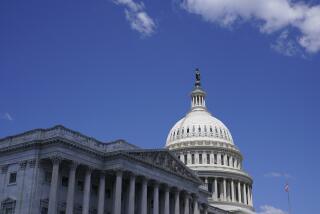Your Name and Privacy --Lost in Cyberspace?
- Share via
Shakespeare wrote, in Othello: “Who steals my purse steals trash. . . . But he that filches from me my good name robs me of that which not enriches him, and makes me poor indeed.”
In cyberspace, it’s getting harder to hang onto one’s good name.
Phil Agre, a professor of communications at UC San Diego, manages an Internet listserv, or subscription e-mail service, called Red Rock Eaters. He reported that recently he has been getting complaints from people who are getting his e-mail but who have not subscribed to his list. Some of them, he’s sure, have been subscribed to the list by e-mail forgers.
Deborah Runkle, a senior program specialist for the American Assn. for the Advancement of Science in Washington, and some of her colleagues recently received a grant from the National Science Foundation to study the ethical, legal and social implications of anonymity and pseudonymity on the Internet.
“I got some e-mail from [U.S. Sen.] Bob Dole yesterday,” Runkle said. “It came from my assistant in the next room, who forged the headers in the message to show me how easy it is.”
Anonymity and pseudonymity (the ability to conceal one’s identity behind a fictional name) are at the heart of an important struggle in information policy in the United States. Some people are fighting to eliminate electronic disguises while others are trying to make them more effective and easier to use.
The principal reasons we want to retain anonymity include privacy and freedom of expression. In a legal ruling last year, McIntyre vs. Ohio Elections Commission, the U.S. Supreme Court ruled that citizens’ anonymity must be protected for political speech. McIntyre was a case that involved a woman who distributed leaflets without identifying who wrote them or where they came from.
We also need forms of anonymity to protect the privacy of cash transactions and the patterns of our general behavior.
But a number of technological developments are threatening anonymity. Caller ID, which displays the number of incoming telephone calls and will be introduced in California on June 1, is one example. And firms interested in electronic commerce on the Internet would like to develop databases of information on the buying habits of individuals.
On the other hand, digital technologies are providing many new ways for people to become anonymous. These technologies include digital encryption, “anonymous re-mailers”--Internet machines that pass on e-mail or files without identifying where they came from--and systems for secure “digital cash.”
David Chaum, a cryptographer who founded the firm DigiCash in the Netherlands, has invented and patented a method by which people can use electronic money anonymously, just as they use coins and paper bills.
But these new forms of anonymity raise even more controversies. If people can “hide out” in cyberspace and protect or fake their identities and activities with layers of encryption, anonymous re-mailers, untraceable digital cash, forged e-mail or other techniques, what is to prevent their committing fraud, embezzlement, extortion or tax evasion in cyberspace?
Some radical libertarian activists are already talking about how electronic anonymity could spell the end of the nation-state.
Bill Frezza, founder of DigitaLiberty, an online libertarian group, has written: “When the combined might of nations tries to chase society’s producers of goods and services down the ‘information superhighway,’ making claims on the fruits of their labor, they will simply disappear into the ether.”
The question is whether we can enjoy the benefits of anonymity--freedom of expression and privacy--and avoid its abuses in a networked world.
Gary Chapman, director of the 21st Century Project at the University of Texas, can be reached via e-mail at gary.chapman@mail.utexas.edu






